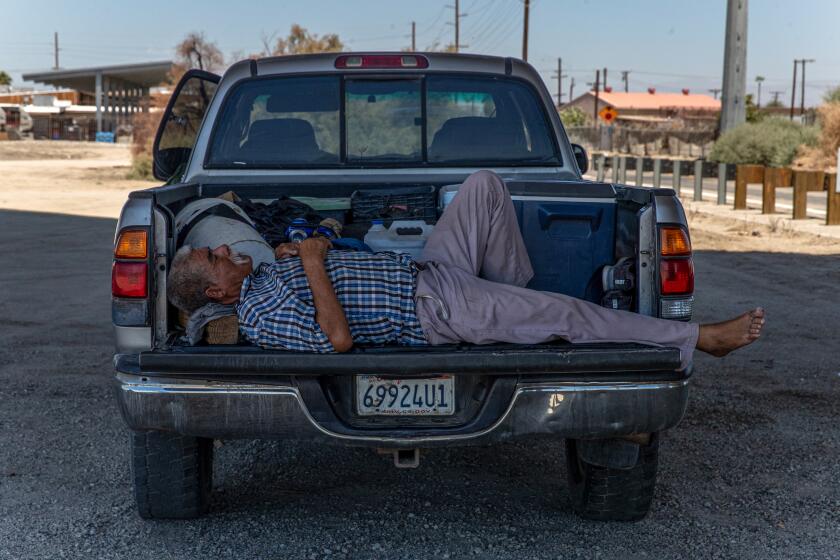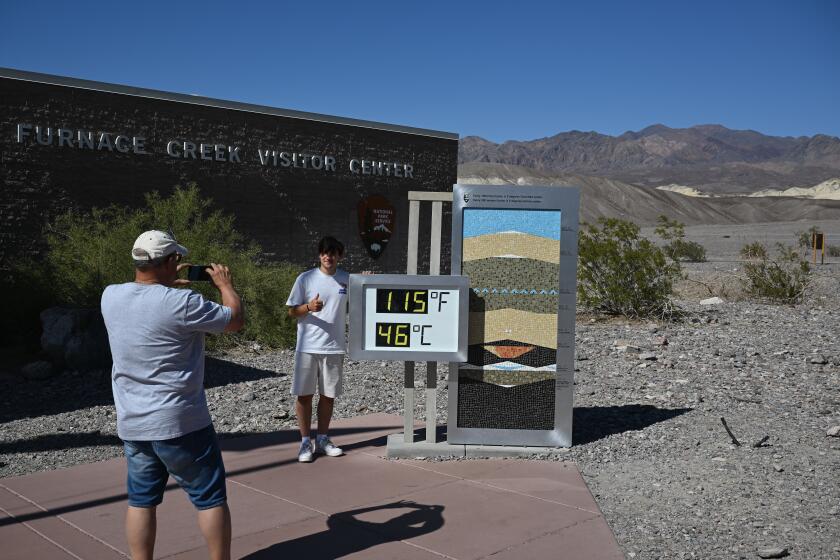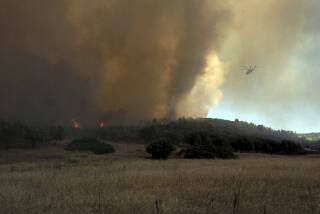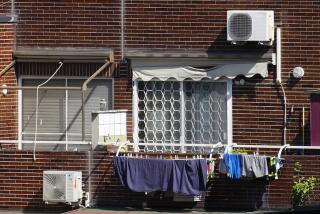Heat wave lashes southern Europe, leaving some tourists in the lurch
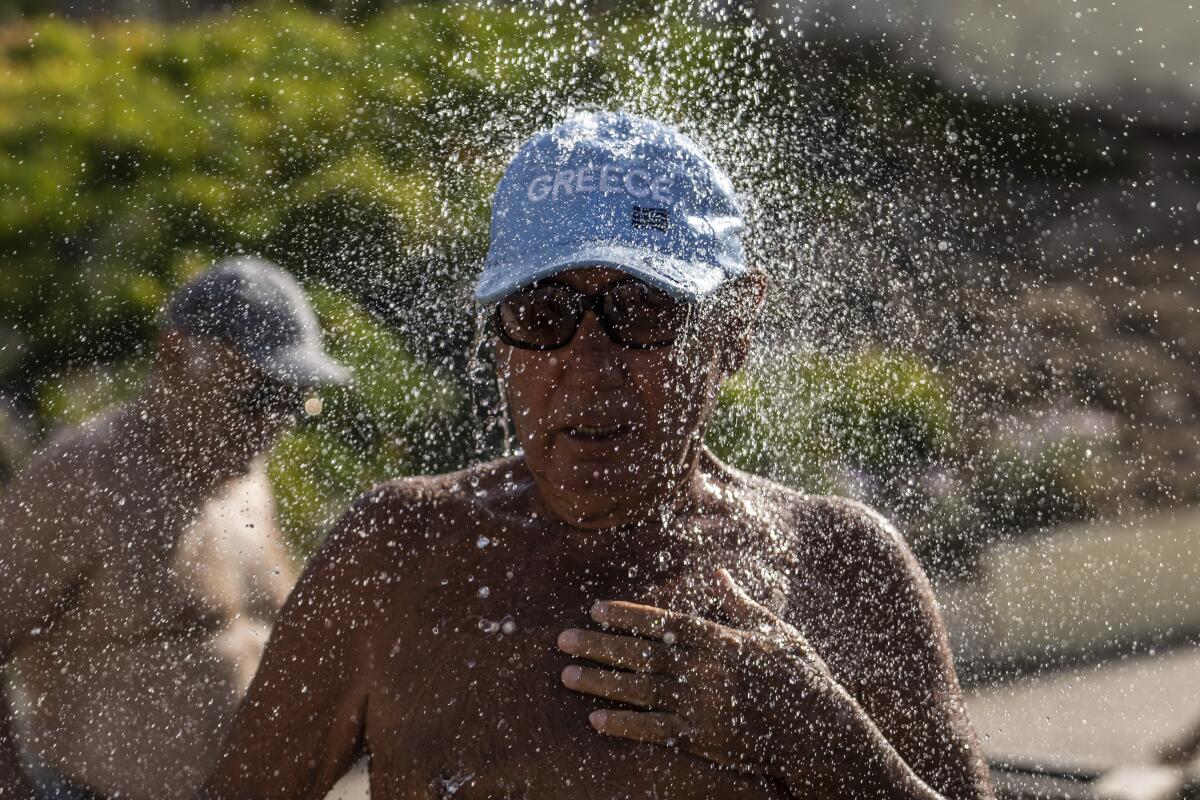
- Share via
NICOSIA, Cyprus — Disgruntled tourists bemoaned the temporary closing of the Acropolis in Athens on Friday as Greek authorities shut the monument’s gates between midday and early evening amid a heat wave that continues to grip southern Europe.
Red Cross staff provided bottled water to tourists wilting in long lines as they hoped to beat the closure and scale the steps up to the gleaming Parthenon temple. Temperatures were expected to peak above 104 degrees in the Greek capital.
Some visitors were frustrated at being left in the lurch because they were unaware of Greek authorities’ last-minute announcement of the Acropolis’ closure at noon. One visitor said he was disappointed because his cruise ship would depart later in the day.
“I even bought a 50-euro [about $56] ticket to skip the line to enter and I couldn’t enter the place,” said the man, who identified himself as Hector from Mexico.
Others who beat the closing time, including Sylvia from Colombia, were elated despite the heat, saying she came prepared.
“We have water; we have some ventilators,” she said. “And I think it’s always an amazing experience to be here.”
As the state settled into a prolonged heat wave, officials warned residents to stay cool. For the homeless and outdoor workers, it’s easier said than done.
Red Cross coordinator Ioanna Fotopoulou said paramedics administered first aid to a number of tourists who were exhibiting symptoms of dehydration and experiencing fainting spells.
In Spain, people packed the beaches as the country enjoyed a short-lived respite from its second heat wave of the summer.
Temperatures were still expected to reach 104 degrees in at least 12 of Spain’s 17 regions Friday, although that’s below the high of 113 that scorched the southeastern town of Albox on Wednesday.
The Aemet state weather agency says another heat wave is expected Sunday, with even higher temperatures yet to come.
Southern California’s inland areas could see triple-digit temperatures all weekend as a high-pressure system means a brutal heat wave.
In Italy, the country’s health ministry Friday warned residents of 10 cities from Bologna to Rome to avoid being out in the midday heat because of extreme temperatures. The same warning has been issued to five additional cities in Sicily, Sardinia and Puglia for this weekend.
On the southeastern island nation of Cyprus, people clustered under air-conditioning units and cooling fans set to full blast as midday temperatures inland were forecast to hit 110 degrees.
Temperatures weren’t expected to go below 77 through the night, while humidity levels, especially along the southern coastline, were expected to reach an uncomfortable 65%.
The temperatures were forecast to hover at the same levels Saturday, with a small dip expected the following day.
Record heat. Raging fires. What are the solutions?
Get Boiling Point, our newsletter about climate change, the environment and building a more sustainable California.
You may occasionally receive promotional content from the Los Angeles Times.
The Cypriot Forestry Service issued a “red alert” regarding the fire hazard, appealing to the public to take extra care and avoid using any machinery outdoors that could spark a blaze.
In the capital, Nicosia, more than two dozen older people sought refuge at a dedicated heat shelter that the municipality reserves for summer heat waves.
The heat is taking a toll on the country’s economy, particularly in the construction sector, where laws obligate employers to offer workers frequent water breaks and shaded rest areas and to even suspend work if temperatures hit specified high levels.
Cyprus Building Contractors Federation Director Yiannos Poumbouris said most contractors adhere to the law, but that often translates to diminished productivity because of delays and additional pay to employees if they are required to work either very early or later in the day to avoid peak temperature hours.
In ‘The Parrot and the Igloo,’ David Lipsky — author of books on West Point and David Foster Wallace — turns his attention to climate-change denial. Let him explain
For instance, cement-pouring must be done either very early in the day or much later. Poumbouris said that there are no figures on lost productivity as it is difficult to gauge, but that the contractors expect this during summer.
Swedish climate activist Greta Thunberg weighed in on the high temperatures in a post on Twitter, saying global heat records should serve as an urgent wake-up call.
“Last week we experienced the hottest days ever recorded, many days in a row. We are also experiencing record high sea level temperatures and record low ice levels. This is an emergency.”
More to Read
Sign up for Essential California
The most important California stories and recommendations in your inbox every morning.
You may occasionally receive promotional content from the Los Angeles Times.
